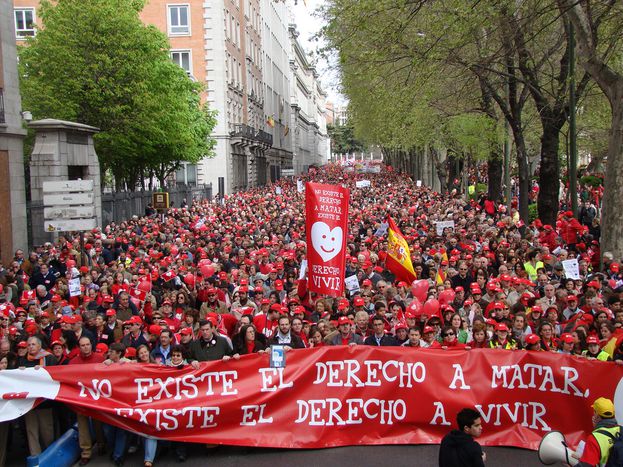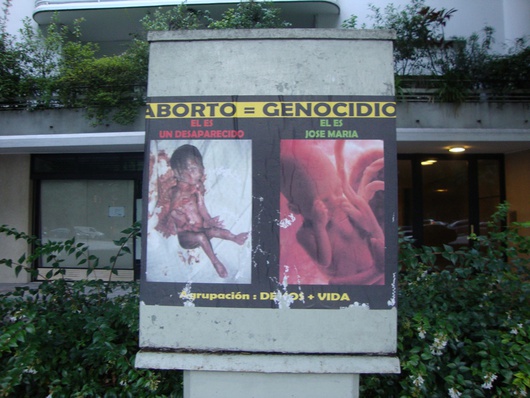
Abortion in Spain: revival of conservatism?
Published on
On 7 March - the eve of international women's day - thousands held a 'march for life' on the streets of Madrid. They were protesting against the voting in of the law on abortion without restriction, as adopted on 24 February by the socialist government of José Luís Rodríguez Zapatero. A French reaction on the law that has caused feelings to run high
It all started in 2004 when José Luís Rodríguez Zapatero announced the legalisation of abortion as one of his election pledges. The law in force at the time punished any doctors performing abortions or women having their pregnancies terminated with imprisonment. Three exceptions made abortion legal: rape, the risk to the physical or mental health of the mother, or a serious foetal abnormality.
You can abort up until 14 weeks of pregnancy in Spain
 In 2008, during Zapatero’s second term in office, the proposal to liberalise abortion law was championed by the minister of equality, Bibiana Aído. and almost one and half years later, on 24 February 2010, the parliament approved a law which legalised accessible and free abortion up to 14 weeks of gestation. It has been criticised and opposed, and has failed to receive the unanimous backing in either Spanish society or the political arena. The most sensitive issue concerns the authorisation which gives adolescents as young as sixteen the right to have an abortion without parental consent. The opposition has condemned it, the church is up in arms, and citizens are objecting and rallying: in March 2009, 500, 000 people gathered in Madrid (10, 000 according to police). In October 2009, there were 1.2 million demonstrators (250, 000 according to police). Finally, on 7 March this year, tens of thousands of people (10, 000 according to Lynce via news agency EFE, 600, 000 according to organisers) flooded the streets of Madrid with chants of Life Yes, AbortionNo.
In 2008, during Zapatero’s second term in office, the proposal to liberalise abortion law was championed by the minister of equality, Bibiana Aído. and almost one and half years later, on 24 February 2010, the parliament approved a law which legalised accessible and free abortion up to 14 weeks of gestation. It has been criticised and opposed, and has failed to receive the unanimous backing in either Spanish society or the political arena. The most sensitive issue concerns the authorisation which gives adolescents as young as sixteen the right to have an abortion without parental consent. The opposition has condemned it, the church is up in arms, and citizens are objecting and rallying: in March 2009, 500, 000 people gathered in Madrid (10, 000 according to police). In October 2009, there were 1.2 million demonstrators (250, 000 according to police). Finally, on 7 March this year, tens of thousands of people (10, 000 according to Lynce via news agency EFE, 600, 000 according to organisers) flooded the streets of Madrid with chants of Life Yes, AbortionNo.
Convinced that the law’s opponents could not be more than the ultra-catholics of Opus Dei, I decided to search for some explanation among my Spanish friends. My grand discovery: although none of them belonged to Opus Dei, some of them were opposed to the abortion law. Furthermore, according to a survey carried out in January by the Spanish polling company Sigma Dos for the daily El Mundo, 48% of young Spaniards were in favour of the law, and 43% against.
Spain is not just Almodovar liberalism
This reality in Spain has little to do with the Almodóvar films in which nuns traffic drugs and the streets of Madrid are dotted with transvestites in platforms. 'Listen, Franco died in 1975. Spain's democracy is only thirty years old!' Magdalena reminds me. Since Franco's death and the arrival of democracy, the church has never really stopped playing a strong role in Spanish political life. In fact, the conservative popular party (PP, 'partido popular') is often criticised for maintaining its special relations with the catholic church. The most vociferous critics even believe that the popular party is no more than the political arm of the church. For instance, the day after the final vote on the law in parliament, the Spanish episcopal conference announced that it would excommunicate any minister who had voted in favour of the law.
However, this church omnipresence goes much further. Spanish society still seems well connected to its catholic roots. For instance, in Spain the only legal union between two people is a religious marriage. In Spain, crucifixes are hung in state schools. According to my friend Pilar, 'In Spain, nobody is shocked when they see two men kiss in the street or adopt a child. However, they freak out if your daughter sleeps with a boy she isn't married to.'
Spain has made definite progress
In my opinion, this law represents undeniable social progress - however Spanish society was perhaps not ready to go quite this far. The most commonly-cited reason for opposing this bill was not so much the principal of unrestricted abortion, but abortions of minors. This last point has since been amended. The new law requires that parents of the minor be at least made aware of the situtation. Pro-abortion campaigners will argue that, if a girl can decide to get married when she is sixteen, why shouldn't she be free to choose to have an abortion?
If a girl can decide to get married when she is 16, why shouldn't she be free to choose to have an abortion?
In my view, the rejection of legal abortion is the denial of the obvious: in 2007, 112, 000 women in Spain had abortions. In 95% of cases, the grounds stated were related to the mother's potential mental distress. This law merely legalises a reality by bringing it into the realm of democracy and opening the debate on the matter of sex education for adolescents. Contrary to the opposition's claims, abortion will never constitute an alternative to contraception. Nor do I believe that this law will lead to an increase in the number of abortions. However, more prevention and education could help destroy the taboo surrounding the question of sex and help prevent unwanted pregnancies.
Images: anti-abortion campaign ©HazteOir.org and ©FabioCherubini/ courtesy of Flickr
Translated from Blocage espagnol sur l'avortement : un regain de conservatisme ?



